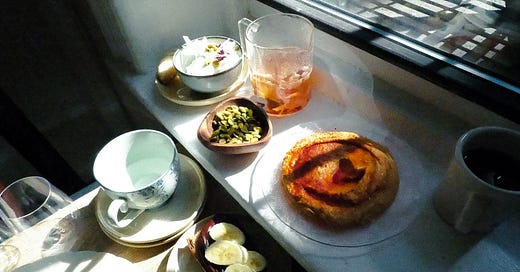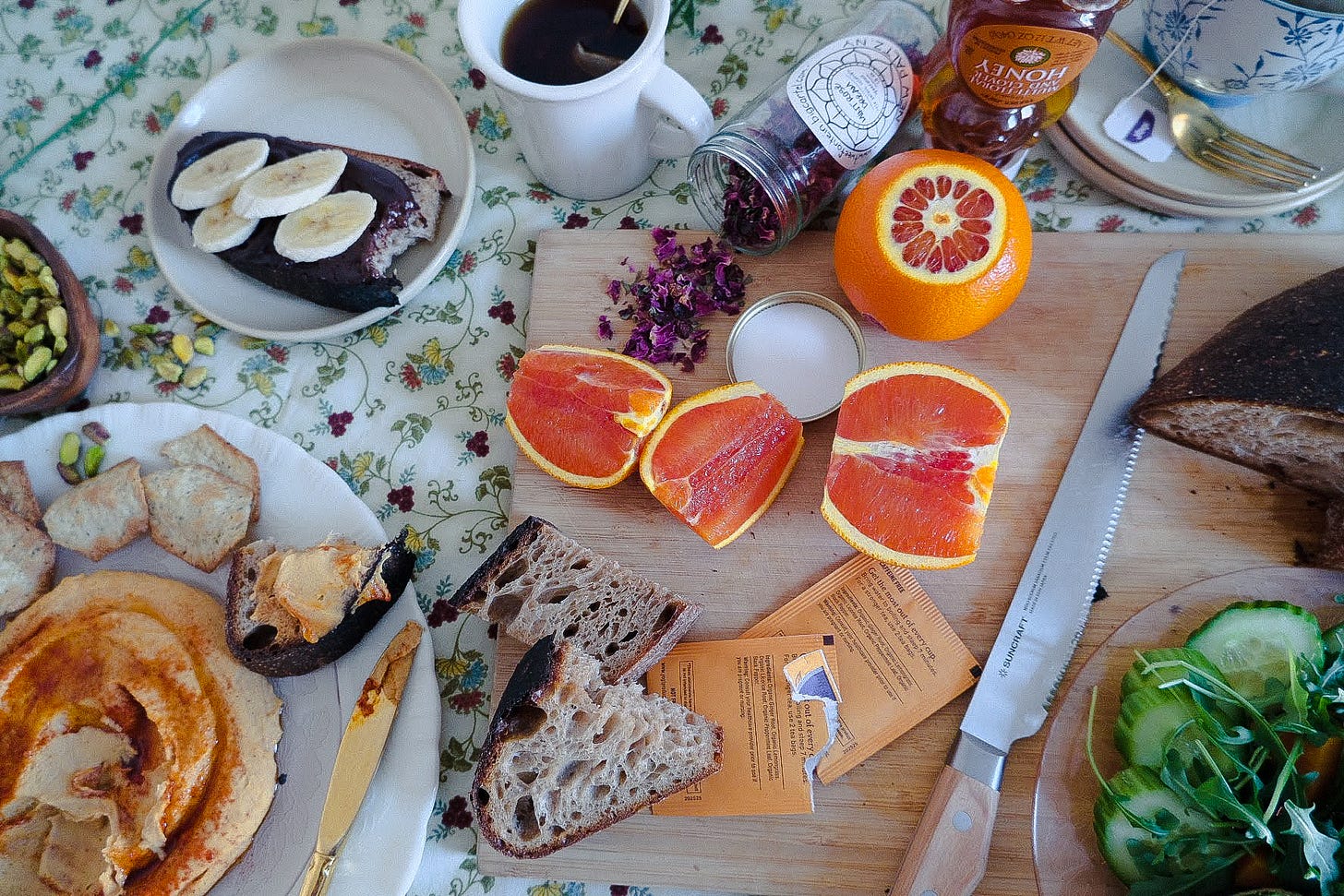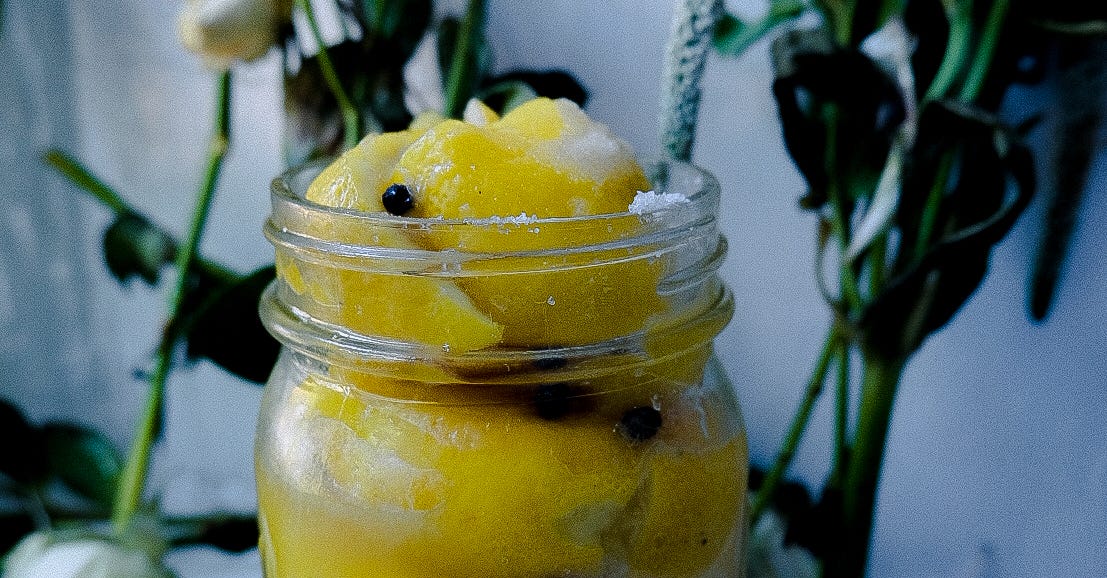Burning Toast & Other Kinds of Burnout - No. 15
And apparently sweet potato is in all my dips now.
Welcome to Vegarie! Where I promise, I usually do much more than complain about my burnout and make dark jokes about locking myself in the walk-in and drowning in a deep tub of chicken stock—probably the stinkiest way to go, if you ask me. If you haven’t already, please subscribe (while it’s still free!) and you'll receive my biweekly newsletter on Tuesdays where I interview women in food—friends, family, home cooks, line cooks, restauranteurs, and bar owners—to build a community and highlight the accomplishments of women in our field. On top of this, I include some recipes for dips, spreads, and other accouterments that will tickle your tongue.
This week’s post doesn’t include an interview, instead, you will find a recipe for a delish sweet potato hummus, preserved lemons, and a very real account of my experience with kitchen-related burnout. The ultimate combo of a dark confession prefacing a tasty recipe. I’m the butt of every food-blog joke.
The term “burnout,” is tossed around like a commonplace definition of working culture in the US. In every case, exhaustion is layered in our voices—physical, mental, creative, and otherwise. The concept of burnout isn’t new to me and I’m sure it isn’t new to you—but on the topic of women in food, I wrote this piece about my burnout on the line that's causing me to think more deeply about my industry.
It’s Tuesday. The sun is out, birds are chirping, and you’re on your walk to work. It’s the fourth day of your 48-hour work week but hey, at least it's your Friday! You’re usually happy about that, right? Ready to rock the day, to end on a good note. But today is different. Today, you woke up to the sun pounding your eyeballs. Its rays stab through the curtain like little knives as if you’d emerged from a dark cave with an intense hangover. But you didn’t drink last night. And now that you think of it, you didn’t even return home that late either. Your joints are swelling, sharp pains drift up your wrist reminding you of your carpal tunnel. You stretch, still in bed, and take a deep breath. It’s not early; it’s actually past 11 am, and you’ve slept close to 10 hours. You feel like you could sleep some more. Your roommate is already off to her 9-5, she’s left behind a cute trail of a storybook morning, maybe a dish stacked on the drying wrack; for a moment you miss your old life. Your muscles feel crunchy, like the thick sourdough you sliced over and over the night before, pressing deeply into your calloused fingers.
You used to feel a spring in your step going in. You used to recognize your improvement during prep, your mise looking a little bit better each day. But too many intense nights have left you crusty, made it harder to notice, and people have been calling out in the kitchen all week. You’ve been working a station for two on your own. It’s not the first time—but you can’t keep up to pace, can’t remember what was fired even 10 seconds later, and the orders keep coming all the same. Your team understands, they even tell you you’re doing a great job. They don't expect you to keep up. The pressure dwindles you all the same. You admit it to yourself, it’s more than the aches and pains of a physically challenging job, your mental health is slipping too.
Your immune system is weak and your body is currently made up of 90% calamari. You can’t help but wonder if the rest of the kitchen is sick, how you’ve managed to remain healthy. Part of you wishes you’d been taken down with them. That you could stay in bed with a bowl of broth instead of carrying 35lbs of it to the walk-in. When you finally arrive at work, you’ve done your best to enjoy the view crossing the bridge, to take in big gulps of fresh air, to convince yourself you’re of a better mindset. Today not one, but two, have called out, Happy Friday! Tonight the line is even shorter. You perk up to comfort your people, “it’ll be fun,” you say. Knowing full and well that while you can physically handle it, your brain is beyond repair at this point. That this specific instance is not the cause, and no one can tell how damaged you feel. You put your head down, you work, and you surprise yourself at how fine it all is…you remember nothing about how you get home. You sleep it off. You sleep some more. Rinse & repeat.
I’m new to the kitchen and have been blaming my burnout—aching joints, mental exhaustion, sleeping over twelve hours on my days off—on being new, but the reality is that everyone is burnt out. And yes, I’m new, but hospitality culture surely isn’t. This thought sent me on a little reading journey re: burnout. What is burnout exactly and why do we all define it differently? Am I just burnt out, or does continuing with my 48-hour workweek regardless of the sharp pains and carpal tunnel signal something deeper? Well, according to burnout expert Jonathan Malesic, “Burnout is when you rest and still don’t bounce back.” In one of his articles, he suggests ways to love work again. He says it’s helpful to recognize the parts of your job that create essential moments for your life, for your routine, so that when you return from a break, you’re able to bounce back. However, from that I’d ask, what’s bouncing back? Is it returning to work with vigor?—With energy and passion to be right back in the kitchen, because it’s you, and you love cooking, right? Or does it look like returning with your shrimp-scented pants and deep kinks in your neck? Does it look like working on injuries and intense anxiety until you break and cry on the line during service? And how do you bounce back the next day, post-tears, when you still don’t feel “bouncy.” All of this to say, I love my job. But I wonder if there's a world that exists where hospitality isn't as deeply flawed. Why, even in the healthiest of kitchens—like mine, with a supportive chef, sous, and team determined to train and support you in one million ways—are there no better systems in place for us to thrive?
The reality is that this isn’t a 9-5. There aren’t plans in place to back you up when you’re sick. You can’t be on leave. Service continues, and it will with or without you. But at what expense? And in the same way a toaster can’t tell if the bread is burning if you keep shoving down the same slice, a system can’t be improved for a cook with burnout if there is no system to begin with. The best you can do is scrape off the little black bits, slather with butter, and hope the customer likes burnt toast.
Sweet Potato Hummus & Preserved Lemon Drizzle
Ingredients
Preserved Lemons
6 lemons, quartered - leaving the bottom attached, still a whole lemon
Kosher salt
Water
1-2 bay leaves
1/2 tsp black peppercorns
Sweet Potato Hummus
1 medium sweet potato
15oz (or 1 can) chickpeas
1/4 c tahini
2 tbs lemon juice + 1 tsp lemon juice (save for oo drizzle on top)
3 cloves garlic
2 tbs olive oil + 2 tsp olive oil (save for oo drizzle on top)
1 tbs finely diced preserved lemon (for drizzle)
Paprika
Salt
Instructions
Preserved Lemons
Scrub all 6 lemons under cold water to clean. Since you will be consuming the skin, organic lemons are highly preferred! These will be squeezed tightly into a canning jar, so have your jar clean and ready to go.
Slice each lemon from the top to within 1/4 inch of the bottom, nearly slicing them into quarters but leaving them attached at one end. Rub kosher salt over the cut surfaces, then reshape the fruit. Use plenty of salt here, this is how they’re preserved. Cover the bottom of the jar with more kosher salt.
Place all the cut lemons in, breaking them apart if necessary to fit. Sprinkle salt over each layer as you add them into the jar. Pressing down on each layer can help if you’re having trouble fitting all the lemons, the juice released will be helpful in the preserving process.
Once all lemons have fit, add your bay leaves and peppercorns. If the jar looks dry or there is any extra space, add a bit of water to cover. A lot of the time the lemons are already so tight and have released enough juice to do this without.
Leave in your fridge for at least one week before use, but these will be better after 2-3 weeks. Please note that if you’d prefer, you can purchase your own preserved lemons to dice for this recipe or skip all together and simply drizzle your hummus with lemon juice and olive oil. BUT — preserved lemons are dope to have on hand. They’re really tasty diced up in all kind of vinaigrettes for salads, or simmered whole in your broth for a stew or rice dish!
Sweet Potato Hummus
Boil or bake your sweet potato until a fork can soft pierce the skin. Allow to cool so you don’t burn your little fingies and remove the skin. Cut into manageable chunks and set aside.
Toss 3 cloves of garlic into your food processor and pulse a few times with your 2 tbs lemon juice and a pinch of salt. Let this sit for 5-10 minutes, it will remove a bit of the bitterness from the raw garlic.
Add in your chickpeas and tahini, blending until combined. Add your sweet potato and a pinch of paprika, taste for salt. You probably need more here. Slowly drizzle in your olive oil 1 tbs at a time until smooth. If your hummus is too thick and you’d like it to become smoother, try placing one ice cube on top of the hummus and processing again. The ice cube should stay on top of the mixture and just ride along, slowly melting and adding more moisture to the mix. It should NOT be pushed down and crushed up to create a lil smoothie situation. But if this happens on accident, don’t worry. Just allow it to melt and continue blending once it has turned to water again.
Create your preserved lemon drizzle to top your hummus. Remove the flesh from the body of the lemon and finely dice about 1 tbs of preserved lemon rind. Add to a small bowl with 1 tsp juice of a fresh lemon, and 2 tsp olive oil, whisk to emulsify.
Once you have reached desired consistency, spoon out onto a serving plate, top with more paprika, and drizzle on your olive oil and preserved lemon situation.






